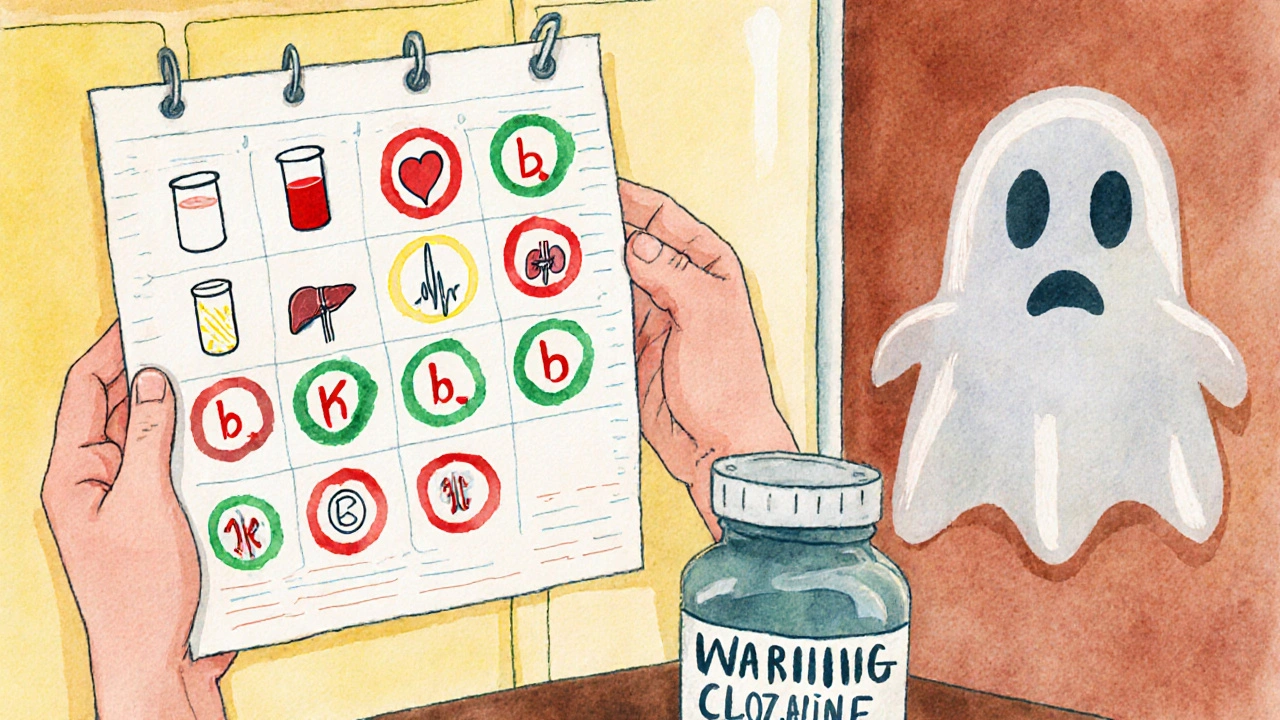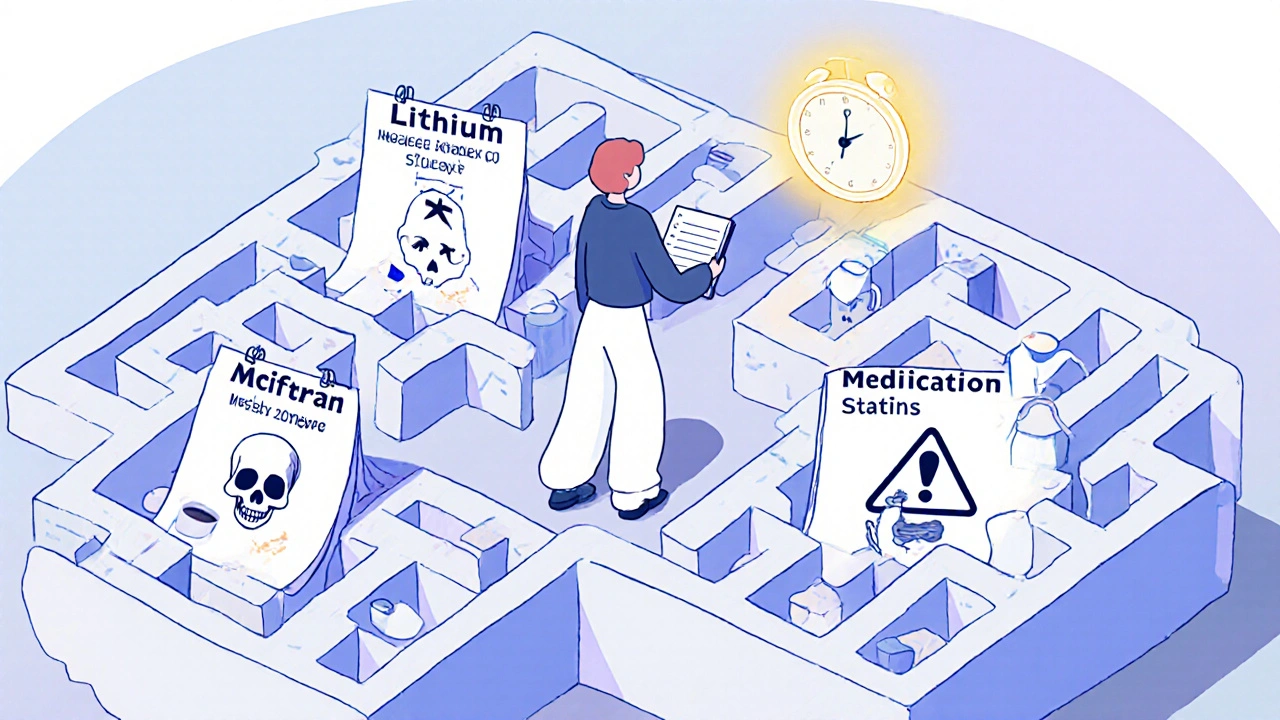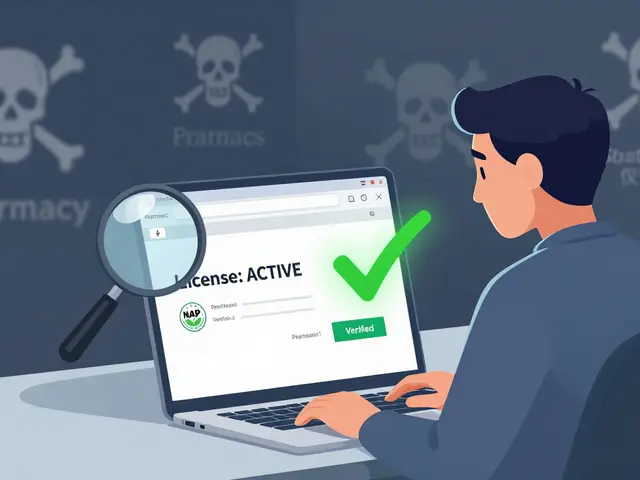
Lab Monitoring Scheduler
Select a medication and date to see your next test schedule.
Remember: Missing tests for these medications can lead to serious complications like infection, kidney damage, or bleeding.
When you start a new medication, especially one with serious side effects, it’s not enough to just take the pill and hope for the best. Some drugs can quietly damage your liver, drop your white blood cell count, or throw your electrolytes out of balance - and you might not feel a thing until it’s too late. That’s where a lab monitoring calendar comes in. It’s not a fancy app or a doctor’s suggestion you can ignore. It’s your lifeline to catching problems before they become emergencies.
Why Your Doctor Isn’t Just Being Extra
You’ve probably heard it before: “We need to check your blood in four weeks.” You nod, write it down on a sticky note, and forget about it by Tuesday. But for medications like clozapine, lithium, or warfarin, missing a single lab test can mean the difference between safety and hospitalization. Take clozapine, used for treatment-resistant schizophrenia. It can cause agranulocytosis - a dangerous drop in white blood cells that leaves you defenseless against infections. The rules are strict: weekly blood tests for the first four months, then every two weeks, then monthly - and that schedule doesn’t stop unless your doctor confirms your counts have been stable for over a year. No exceptions. Skip one test, and you risk missing the early warning signs. Lithium, a common mood stabilizer, is even sneakier. It builds up in your body over time. If your kidneys can’t clear it fast enough, you get lithium toxicity: tremors, confusion, even seizures. That’s why your levels need to be checked 5 to 7 days after starting it, then weekly until stable. After that? At least every six months - even if you feel fine. Many patients think, “I’m not having side effects, so I don’t need the test.” That’s exactly how people end up in the ER.What Tests You Need - And When
Not all medications need the same monitoring. Here’s what’s actually required for common drugs:- Clozapine: Absolute neutrophil count (ANC) weekly for first 18 weeks, then every two weeks for the next six months, then monthly. Lifelong monitoring if you’ve ever had ANC below 1500/μL.
- Lithium: Serum lithium levels every 5-7 days after starting, then weekly until stable. After that, every 3-6 months. Also check kidney and thyroid function annually.
- Warfarin: INR test monthly, but increase to weekly during dose changes, after antibiotics, or if you start new supplements. A single missed test can lead to dangerous bleeding or clots.
- Statins: Liver enzymes (ALT, AST) at baseline, then 12 weeks after starting, then every 6-12 months if stable.
- Systemic corticosteroids (over 2 weeks): Morning cortisol test before stopping to check for adrenal suppression. Many patients don’t know this - they just stop the pill and collapse from adrenal crisis.
- Glaucoma eye drops (e.g., dorzolamide/timolol): Annual eye exams to monitor for corneal damage or pressure changes. Easy to overlook, but critical.
Digital Tools vs. Paper Calendars - Which Works?
You’ve got options. But not all are created equal. Some people swear by printable templates - like the ones from Community Behavioral Health or CBH Philly. They’re simple, free, and you can tape them to your fridge. But they don’t remind you. They don’t sync with your phone. If you miss a test, there’s no alert. Then there are apps like Blood Cancer United’s Health Manager. This one lets you log not just lab dates, but also symptoms: nausea, dizziness, fatigue. It even links side effects to meals or sleep patterns. One user noticed her headaches always started two hours after taking her antipsychotic - a pattern her doctor never caught because she never connected the dots. Ulta Lab Tests lets you order your own blood work, which sounds great - until you realize you still need a provider to interpret the results. Ordering the test is half the battle. Understanding what the numbers mean? That’s the other half. The best system? A hybrid. Use a digital app for reminders and symptom tracking, but print out a monthly summary to bring to every appointment. Your doctor doesn’t have time to scroll through your phone. But they’ll look at a paper calendar with dates, numbers, and notes.How to Build Your Own Lab Monitoring Calendar
Start with your prescription. Look up the drug’s monitoring guidelines - not what your doctor says, but what the official guidelines say. The NIH, FDA, and drug manufacturers (like Taiho Oncology for LONSURF) publish clear protocols. Then follow these steps:- Write down every required test and the exact timing (e.g., “INR test 48 hours after warfarin dose” or “ANC test every Monday morning before breakfast”).
- Mark the first test date on your calendar. Set phone reminders for 7 days, 3 days, and 1 day before.
- Link each test to a side effect. For example: “If my ANC drops below 1000, call my doctor immediately - no waiting.”
- Update it every time your dose changes. A new dose means a new schedule. Don’t assume your old calendar still works.
- Bring it to every appointment. Even if your doctor has your chart, they might not have seen your personal log. Your calendar gives them context.
The Hidden Danger: When You Stop Monitoring
The biggest mistake? Thinking you’re “off the hook” after a few months. A patient on clozapine for five years stopped weekly blood tests because “I’ve been fine.” He didn’t realize his ANC had been slowly dropping. By the time he got sick, his white cell count was below 200 - and he nearly died from an infection. Or the woman on lithium who skipped her six-month check because she “felt great.” Her kidney function had declined 30% over a year. She didn’t know until she started swelling and couldn’t urinate. Monitoring isn’t about distrust. It’s about science. These drugs work because they change your body’s chemistry. Your body doesn’t always tell you when it’s overwhelmed.
What Happens If You Skip a Test?
Some medications have built-in safety nets. For clozapine, your pharmacy won’t refill your prescription without proof of a recent ANC test. That’s the REMS program - a federal safety rule. But for lithium, statins, or warfarin? No such lock. You can refill your script even if you’ve missed three tests. That’s on you. Skipping tests doesn’t mean you’ll get sick tomorrow. But it does mean you’re playing Russian roulette with your health. One missed INR test can lead to a stroke. One missed lithium check can cause permanent kidney damage.Real Talk: Staying on Track
Let’s be honest - life gets busy. Kids get sick. Work gets crazy. You forget. Here’s what actually works:- Pair your test with a habit. “I get my blood drawn every Monday after my coffee.”
- Use a shared calendar. Give your partner or caregiver access to your phone calendar. Let them remind you.
- Keep a small notebook in your wallet with your test dates and emergency numbers.
- Don’t wait for your doctor to remind you. They’re juggling 30 patients. You’re the only one who cares about your body.
The Future: Smarter Monitoring
New tools are coming. Apps now sync with wearables - tracking your heart rate, sleep, and activity to flag anomalies. Some AI models are being tested to predict toxicity based on your past lab trends. If your last three lithium levels rose by 0.1 each time, the app might warn you: “You’re at risk for toxicity in 14 days.” But right now? The best tool is still a calendar. A simple, printed, updated, carried-with-you calendar. Because when it comes to your health, you don’t need the future. You need to show up - on time, every time.Do I really need a lab monitoring calendar if I feel fine?
Yes. Many dangerous side effects - like low white blood cell counts, rising lithium levels, or liver damage - don’t cause symptoms until they’re severe. Feeling fine doesn’t mean your body is safe. Lab tests catch problems before you feel them.
Can I just rely on my doctor to remind me?
No. Doctors see dozens of patients a day. Your medication schedule is just one item on their list. If you don’t track your own labs, you’re the only one responsible for making sure they happen. Relying on your doctor to remind you is like expecting your car to tell you when to change the oil.
What if I miss a lab test?
Call your doctor immediately. Don’t wait. For some meds like clozapine or warfarin, missing a test means you can’t refill your prescription until you’re tested. For others, like lithium, you may need to reschedule the test ASAP and possibly hold your dose until results are back. Never skip and assume it’s fine.
Are digital apps better than paper calendars?
Apps are great for reminders and tracking symptoms, but paper calendars are better for appointments. Doctors can’t pull up your phone during a 10-minute visit. Print out your digital log each month and bring it with you. Use both - the app for alerts, the paper for proof.
Can I order my own lab tests without a doctor?
You can order some tests through services like Ulta Lab Tests, but you still need a doctor to interpret them. Numbers like INR or lithium levels mean nothing without context. Ordering the test is easy. Understanding what it means - and what to do next - isn’t.
How often do I need to update my calendar?
Every time your medication dose changes, you start a new drug, or your doctor adjusts your monitoring plan. Even if you’re on the same meds, your body changes. A calendar that worked last year might not be right this year. Revisit it every 3 months.
What if I can’t afford the lab tests?
Talk to your pharmacist or clinic. Many hospitals and community health centers offer low-cost or sliding-scale labs. Some drug manufacturers provide free monitoring programs for high-risk meds like clozapine or LONSURF. Never skip a test because of cost - ask for help instead.






11 Comments
For anyone in India: my clinic in Delhi offers free lithium monitoring if you ask. Don't let cost stop you.
Also, clozapine? That's for people who can't afford to be alive. Just saying.